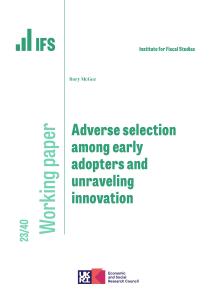This paper documents significantly steeper declines in nondurable expenditures at older ages in the United Kingdom compared to the United States, in spite of income paths being similar. Several possible causes are explored, including different employment paths, housing ownership and expenses, levels and paths of health status, number of household members, and out-of-pocket medical expenditures. Among all the potential explanations considered, those relating to health care—differences in levels and age paths in medical expenses and medical expenditure risk—can fully account for the steeper declines in nondurable consumption in the United Kingdom compared to the United States.
Authors

CPP Co-Director
James is Senior Research Fellow and Professor of Economics at Manchester, working on broad issues in the economics of retirement, savings and health.

CPP Co-Director
Richard is Co-Director of the Centre for the Microeconomic Analysis of Public Policy (CPP) and Senior Research Fellow at IFS.

James Smith

Associate Director
Peter joined in 2009. He has published several papers on the microeconomics of household spending and labour supply decisions over the life-cycle.
Journal article details
- DOI
- 10.1257/pol.20170182
- Publisher
- American Economic Association
- Issue
- Volume 11, Issue 3, October 2019, pages 27-54
Suggested citation
Banks, J et al. (2019). 'Life-cycle consumption patterns at older ages in the United States and the United Kingdom: can medical expenditures explain the difference?' 11(3/2019), pp.27–54.
More from IFS
Understand this issue

Don’t cheer end of earnings squeeze: there is more pain to come
19 June 2023

It's time to stamp on a tax that penalises landlords and renters
22 January 2024

Why inheritance tax should be reformed
18 January 2024
Policy analysis

How do the last five years measure up on levelling up?
19 June 2024

Tax and public finances: the fundamentals
23 August 2023

Pensions: five key decisions for the next government
7 June 2024
Academic research

Saving by buying ahead: stockpiling in response to lump-sum payments
2 February 2024

Adverse selection among early adopters and unraveling innovation
18 December 2023

The impact of labour demand shocks when occupational labour supplies are heterogeneous
28 June 2024